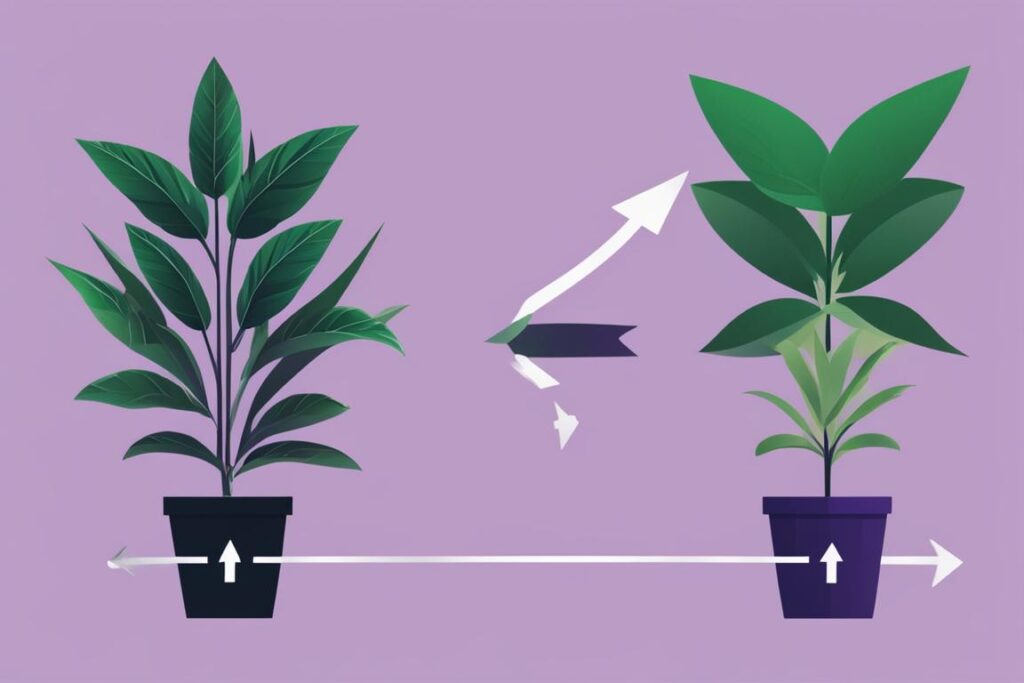CBG, also known as cannabigerol, is a cannabinoid found in hemp and cannabis sativa plants. It is often referred to as “the mother of all cannabinoids” because other cannabinoids, including CBD, are derived from it. While CBG is derived from plants, research on its potential benefits and risks is still in its early stages. CBG is non-psychoactive, meaning it does not produce a “high” reaction like THC. CBG is available in various forms, including tinctures, gummies, capsules, and topical creams. It is often combined with CBD in products due to their complimentary benefits, such as reducing inflammation and pain. However, more research is needed to fully understand the effects and potential benefits of CBG for women’s health.
Key Takeaways:
- CBG is a cannabinoid found in hemp and cannabis sativa plants.
- It is non-psychoactive and does not produce a “high” like THC.
- CBG is available in various forms, including tinctures, gummies, capsules, and topical creams.
- More research is needed to fully understand the effects and potential benefits of CBG for women’s health.
- CBG can be combined with CBD in products to enhance its benefits.
The Potential Benefits of CBG for Women’s Health
When it comes to women’s health, CBG, or cannabigerol, has shown promise in providing various potential benefits. Although research in this area is still limited, some observed effects are worth exploring. It’s important to note that further rigorous research is needed to establish the effectiveness of CBG for women’s health concerns.
One potential benefit of CBG is its role in managing chronic pain. CBG’s anti-inflammatory properties make it a promising option for women dealing with chronic pain conditions such as arthritis or endometriosis. By reducing inflammation in the body, CBG may help alleviate pain and improve overall well-being.
In addition to pain management, CBG may have a positive impact on anxiety and sleep. While more robust studies are necessary to confirm these effects, initial research suggests that CBG may help reduce anxiety symptoms and improve sleep quality. This could be particularly beneficial for women who experience anxiety disorders or sleep disturbances.
Furthermore, CBG’s potential effects on women’s reproductive health are worth exploring. Preliminary studies indicate that CBG may have neuroprotective and neuromodulatory effects that could potentially contribute to improved reproductive health outcomes. However, it is crucial to emphasize that further research, particularly in human trials, is necessary to validate these preliminary findings.
Overall, while CBG holds promise as a potential supplement for women’s health, it is essential to approach it with caution. As with any supplement, it is advisable to consult with a healthcare provider, especially for women with underlying health conditions or those who are taking medications or other supplements. Working with a healthcare professional can help ensure personalized guidance and a comprehensive understanding of CBG’s potential benefits in the context of individual health goals.
The Safety and Regulation of CBG Products
When it comes to CBG products, safety and regulation are important considerations, especially for women’s health. Unlike medications approved by the FDA, CBG products are currently not regulated by the Food and Drug Administration. This means that there are no standardized guidelines or quality control measures in place to ensure the safety and accuracy of CBG products.
To ensure the safety of CBG products, it is crucial to purchase from reputable sources that provide third-party testing and certificates of analysis (COAs). These documents provide independent verification of the product’s contents, including the levels of CBG and other cannabinoids. By reviewing the COA, you can ensure that the product you are purchasing is accurately labeled and free from harmful contaminants.
It is also recommended to consult with a healthcare provider, particularly a naturopathic doctor, before trying any CBG products, especially for women with underlying health conditions, taking medications, or other supplements. Naturopathic doctors may have more knowledge about herbs, including hemp, and can provide guidance on CBG usage specific to women’s health.
The Importance of Third-Party Testing and Certificates of Analysis (COAs)
Third-party testing and COAs are essential for verifying the safety and accuracy of CBG products. These documents provide transparency and assurance to consumers, allowing them to make informed decisions about the products they are purchasing. Without proper regulation, it is crucial for consumers to take the responsibility of ensuring the quality and safety of CBG products into their own hands.
| Reasons to Verify CBG Product Safety | Actions to Take |
|---|---|
| Confirm accurate labeling and potency | Review the COA to ensure the levels of CBG and other cannabinoids match the label |
| Detect the presence of harmful contaminants | Check for COAs that test for contaminants such as pesticides, heavy metals, and microbial organisms |
| Ensure product consistency and quality | Choose products from companies that consistently provide third-party testing and COAs |
By following these guidelines and consulting with healthcare providers, women can prioritize their safety and well-being when considering the use of CBG products.
CBG vs. CBD: Similarities and Differences
When it comes to cannabinoids, CBG and CBD are two popular compounds that have gained attention for their potential benefits in women’s health. While they share some similarities, including being non-psychoactive and having anti-inflammatory properties, there are also key differences to consider.
CBG, or cannabigerol, is often referred to as “the mother of all cannabinoids” because it is a precursor to other cannabinoids, such as CBD. It is more likely to be an appetite stimulant, making it a potential option for women who struggle with appetite suppression. On the other hand, CBD is more likely to be an appetite suppressant, which may be beneficial for women looking to manage their weight or control cravings.
Both CBG and CBD have shown promising potential in managing chronic pain and reducing inflammation. They interact with the endocannabinoid system in our bodies, which plays a role in regulating pain, mood, and immune response. However, CBG has been found to have a stronger affinity for the CB1 and CB2 receptors in the endocannabinoid system compared to CBD.
Potential Benefits of CBG:
- Appetite stimulation
- Anti-inflammatory properties
- Pain management
- Neuroprotective effects
Potential Benefits of CBD:
- Appetite suppression
- Anti-inflammatory properties
- Pain management
- Anxiety reduction
While CBG and CBD have their own unique characteristics, it’s important to note that more research is needed to fully understand their specific effects and mechanisms of action. Consulting with a healthcare provider can help determine the most appropriate cannabinoid or combination of cannabinoids for individual health goals.
| Cannabinoid | Appetite | Anti-inflammatory | Pain Management | Neuroprotective Effects | Anxiety Reduction |
|---|---|---|---|---|---|
| CBG | Stimulant | Yes | Yes | Yes | No |
| CBD | Suppressant | Yes | Yes | No | Yes |
As research on cannabinoids continues to evolve, it’s essential to stay informed and consult with healthcare providers when considering CBG or CBD products for women’s health. They can provide personalized guidance based on individual needs and help navigate the available options.

The Future of CBG Research and Usage
As I wrap up this article on CBG and women’s health, it’s clear that there is still much to learn about this fascinating cannabinoid. While the existing research shows promise for CBG’s potential benefits, it’s important to note that most studies have been conducted on animals or small groups of people. We need larger-scale studies, including human trials, to draw definitive conclusions.
Fortunately, as the popularity of CBG continues to grow, so does the interest in its research. In the future, we can expect to see more studies exploring the effects of CBG on women’s health. These studies will provide us with a better understanding of CBG’s mechanisms of action and its specific benefits for women.
If you’re considering trying CBG products for women’s health, it’s important to stay informed. Keep an eye on the latest research and consult with healthcare providers who are knowledgeable about cannabinoids. They can guide you in making informed decisions based on your individual health goals and needs.
While we await more extensive research, it’s evident that CBG holds promise for women’s health. It’s an exciting area of exploration, and I look forward to seeing how CBG continues to evolve and contribute to the well-being of women everywhere.
FAQ
What is CBG?
CBG, also known as cannabigerol, is a cannabinoid found in hemp and cannabis sativa plants. It is often referred to as “the mother of all cannabinoids” because other cannabinoids, including CBD, are derived from it.
Is CBG psychoactive?
No, CBG is non-psychoactive, meaning it does not produce a “high” reaction like THC.
What forms does CBG come in?
CBG is available in various forms, including tinctures, gummies, capsules, and topical creams.
Are there any potential benefits of CBG for women’s health?
While research on CBG’s specific effects on women’s health is limited, there are some potential benefits that have been observed, including possible relief from chronic pain, anxiety, and sleep issues.
Is CBG regulated by the FDA?
CBG products are currently not regulated by the Food and Drug Administration (FDA).
How can I ensure the safety of CBG products?
It is important to ensure the safety and accuracy of CBG products by purchasing from reputable sources that provide third-party testing and certificates of analysis (COAs).
Should I consult a healthcare provider before trying CBG products?
Yes, it is recommended to consult with a healthcare provider, particularly a naturopathic doctor, before trying any CBG products, especially for women with underlying health conditions, taking medications, or supplements.
What is the difference between CBG and CBD?
CBG and CBD share some similarities, such as being non-psychoactive compounds and having anti-inflammatory properties, but they have different molecular makeups, causing them to have slightly different effects on the body.
Is there more research needed on CBG for women’s health?
Yes, the scientific research on CBG is still in its preliminary stages, and more robust and large-scale studies, including human trials, are needed for definitive conclusions.
What should I consider when purchasing CBG products for women’s health?
It is important to purchase from reputable sources, verify the contents of the products, and consult with a healthcare provider to determine the most appropriate cannabinoid or combination of cannabinoids for individual health goals.
Source Links
- https://www.forbes.com/health/cbd/cannabigerol-cbg/
- https://www.verywellmind.com/cannabigerol-cbg-uses-and-benefits-5085266
- https://www.ncbi.nlm.nih.gov/pmc/articles/PMC8467477/
Author Profile

Latest entries
 BlogFebruary 20, 2024I Just Found the Ultimate Clog-Free Vape Cartridge! (Yes, They Exist!)
BlogFebruary 20, 2024I Just Found the Ultimate Clog-Free Vape Cartridge! (Yes, They Exist!) BlogJanuary 16, 2024In the Clouds with Creativity: A Blunt Encounter with Montreal’s Fluid Art Maestro
BlogJanuary 16, 2024In the Clouds with Creativity: A Blunt Encounter with Montreal’s Fluid Art Maestro BlogDecember 25, 2023Sativa: Enhancing Outdoor Adventures
BlogDecember 25, 2023Sativa: Enhancing Outdoor Adventures BlogDecember 25, 2023Enhancing Memory with Sativa
BlogDecember 25, 2023Enhancing Memory with Sativa





